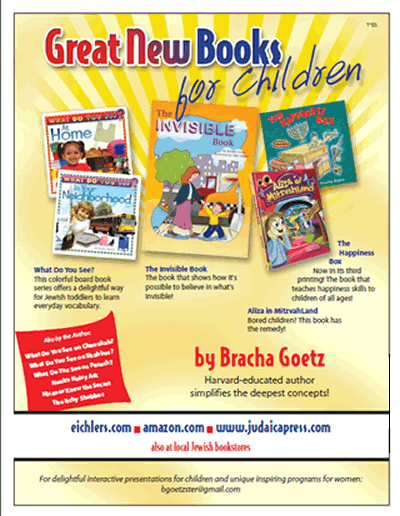Just about all of us have had our identities stolen from us. I think I lost mine about 53 years ago, but I only realized it last night. Thanks to my husband. Over dinner last night, he pointed out to me that we’d had our identities stolen.
Truth is, it was probably a lot longer than just the 53 years of my life. It could have happened centuries ago, for all I know. But who’s going to notice these things? When our spiritual identities are stolen from us, we don’t panic at all. Because we don’t even know they are missing. And we don’t even know what we’re missing.
Did it begin when crammed boats of us came over from Europe around the turn of the 20th Century?How many thousands of pairs of tefillin were gleefully tossed overboard on the way to the land of new opportunities? That can’t be when our spiritual identities got lost, though. Most of the Jewish people on board were carrying with them an extremely heavy tradition that they, generally, did not understand. They honestly did not know why they should continue holding onto it. Why did so many Jews toss their legacy overboard into the Atlantic Ocean – before even going ashore? They were convinced that their heritage would weigh them down in a land of – freedom.
Today we are mostly free of the Jewish identities that were taken from us. “Why be Jewish?†isn’t even a question anymore for the vast majority of young assimilated Jews who feel that all religions are equivalent and “falling in love†with non-Jews should be embraced. Judaism, if thought about at all, is viewed as a cultural relic, with restrictive archaic traditions. And if we aren’t spiritual beings with a noble mission here on earth, who needs spiritual directives anyway?
In kindergarten, they did teach us to share. Beyond that, it was exceedingly rare for us to be provided with any useful knowledge about our development as spiritual entities – anywhere around us. Not on TV, not in movies, not on billboards, not in Seventeen Magazine – and not even iback n Hebrew school!
Just as with financial identity theft, which basically disconnects us from our financial abilities, spiritual identity theft essentially disconnects us from our spiritual abilities. Here’s one important difference between them, though. With financial identity theft, our identities are used by others. With spiritual identity theft, nobody bothers. Once stolen, it’s tossed in the garbage, like an old worn-out wallet.
Spiritual Identity Theft has an acronym that fits. Spiritual Identity Theft usually causes its victims to sit and do nothing about it. Since we don’t even know what we’re missing, it is so easy toâ€successfully” cover up the underlying emptiness by going after other pursuits. And if the painful awareness ever does surface, it gets shoved down as quickly as possible with a vast array of distractions from which to choose. Some are harmful, and most are numbing, but even the benign material pleasures just don’t last long enough.
It appears as if financial identity theft is much more important than spiritual identity theft, but before you know it, we’ll have to throw all the Monopoly money back into the box anyway. Even Boardwalk and Park Place too. Soon they’ll all disappear.
And we just cannot accept that nothing will remain from our entire lifetimes. There has to be something permanent in this throwaway society. We know it. Within each of us, there is a still small voice that won’t give up insisting something lasts.
The voice comes from within each empty soul that has had its spiritual identity stolen.
What finally fills my soul, nurtures what has always lined the inner walls of my being. Each morsel of pure nourishment enlivens something that was already present, but dormant. I found morsels of spiritual nourishment in other religions and practices as well, while out searching. But it is only Jewish spiritual wisdom that could fit, like the missing puzzle piece, in my neshama.
I am still peeling off the layers that “successfullyâ€covered up my essence. Through understanding more and more about why being Jewish is vital, I identify more closely with my neshama. Just as with financial identity theft, it can be a long and difficult process to reclaim one’s identity. But as I come to recognize my true self, the pleasures I am experiencing aren’t fleeting and they aren’t shallow. They go deeper than even the Atlantic ocean.
It can take years of work and determination, but every struggle is so worth it. Those credit cards with our Jewish names – they can still be found.
This is what Alan found in the garbage one day:
movie ticket stubs,
crumpled candy wrappers,
a partially eaten ham and cheese sandwich,
yesterday’s newspaper,
empty soda cans,
crushed cigarette butts,
and an old pair of tefillin.
Then Alan suddenly understood why
he had been desperately searching
through garbage
for years and years.
He must have known,
deep down,
that along with the trash,
what still had value, the most value,
was also being thrown away.
Alan stuck his hand into the garbage
and pulled out the tefillin.
Then,
for years and years,
in turn,
the tefillin searched desperately,
found its way
through the garbage piled high in Alan,
and pulled out Aharon.
Bracha Goetz is the Harvard-educated author of eleven children’s books, including Aliza in MitzvahLand, What Do You See at Home? and The Invisible Book. To enjoy Bracha’s presentations, you’re welcome to email bgoetzster@gmail.com.

